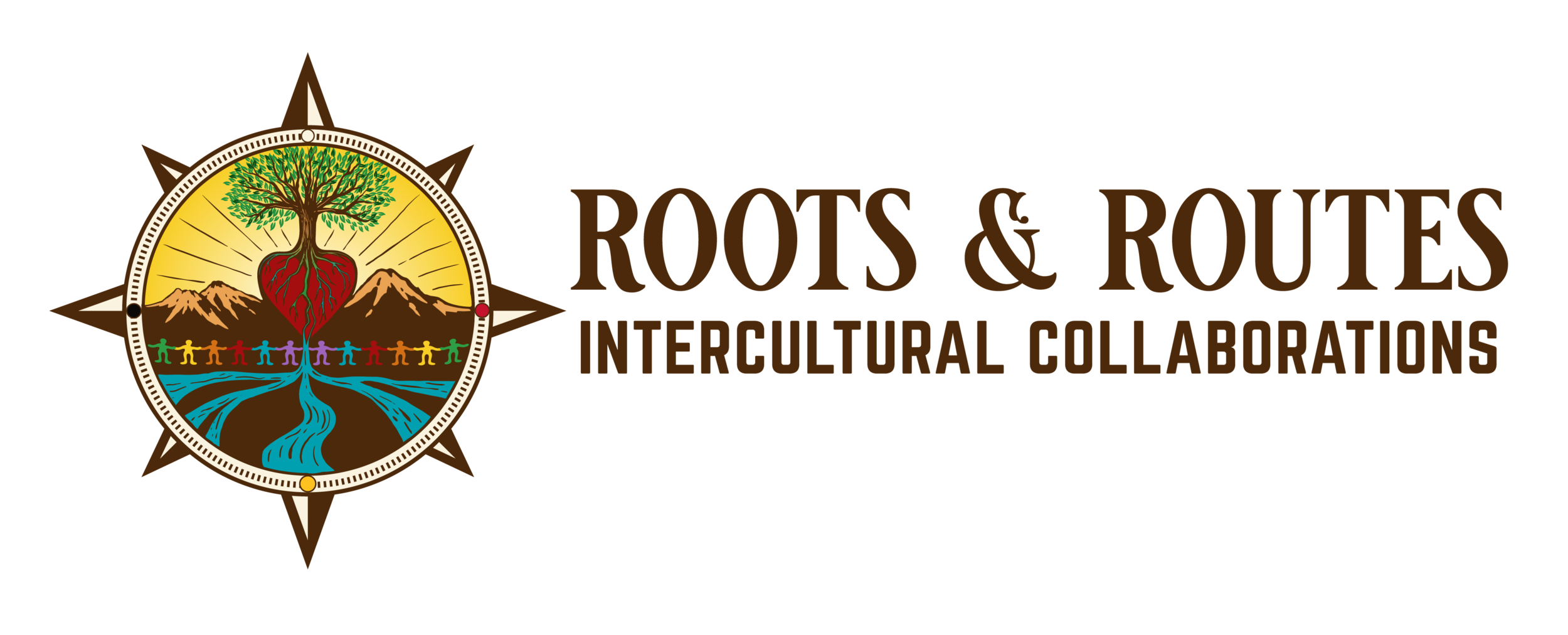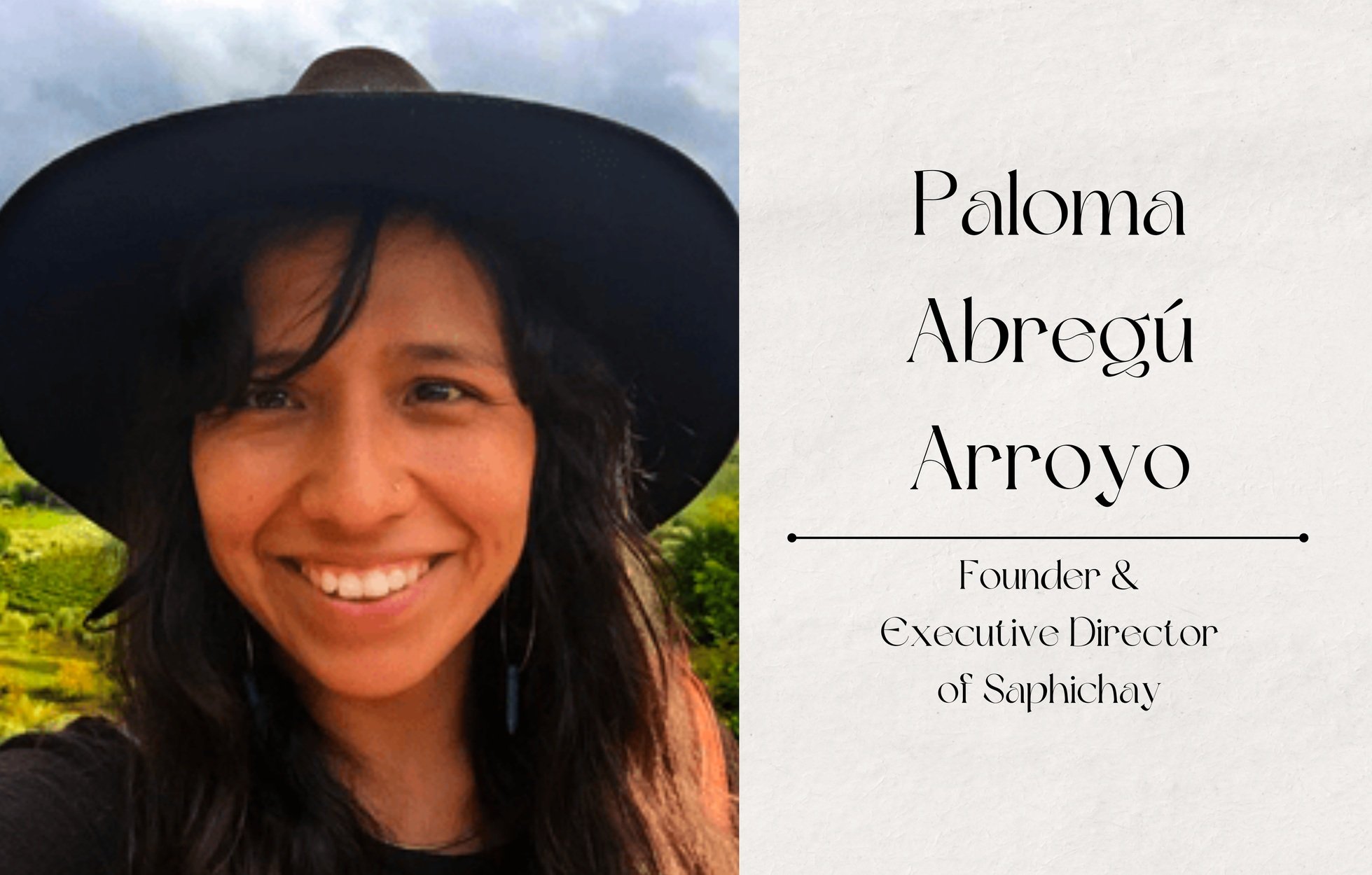Revitalizing Identity as a Form of Resistance: Teachings from Paloma Abregú Arroyo
“I highly value the fact that I was raised traditionally in many ways... For me, so much of this has to do with valuing your identity, ethnic customs, knowledge, and practices.”
Paloma Arroyo, Founder & Executive Director of Saphichay
On the 21st of August 2022, Roots & Routes’ Youth Visionary Collective (YVC) was honored to meet virtually with Paloma Abregú Arroyo, Founder and Executive Director of Saphichay. She spoke about her personal experiences that have led to her vision and work centering on revitalizing one's identity.
Paloma highlighted the importance of everyone finding ways to anchor themselves and create a sense of belonging, with her own example being the use of meditation. She shared how these practices could help with better understanding obstacles to more harmony, from personal to global scales. Here we will share with you Paloma’s teachings on the importance of (re)connecting to one’s roots, actively situating oneself within one’s identity, and learning to be grounded in the present.
Paloma’s organization, Saphichay, was founded in 2013. In the following years, the organization started projects centering on Indigenous cultural revitalization and rights in Peru. Early projects working with farmers and students took place in Lima, Cusco, and Huaraz. From 2015 to now, Saphichays work is based out of Huancayo, the capital of the Department of Junin, in Peru’s Central Andes region. They do educational and justice work with youth in the Andes, especially in relation to how to confront extractive processes like mining. She explained the meaning of the word Saphichay to us:
“Saphichay is Quechua Chanka. … It means ‘to take root’ or ‘my roots’. The reason that name came about for the work we do is because the idea is to root oneself in one’s identity.”
Today, despite Indigenous and environmental movements that emphasize the importance of ancestral cultures and are rights-based, Indigenous ways of knowing still often get ignored or written off as less valuable than Western ways of knowing. Saphichay offers a valuable support system by interconnecting Indigenous communities and organizations around the world. Together, they work towards Indigenous rights and strengthening Indigenous philanthropic (donor relations) networks and access.
Indigenous philanthropy, she said, is very important because Indigenous peoples are the defenders and protectors of the majority of the world’s biodiverse places. They have been taking care of these places since time immemorial, and the fact that they are still biodiverse serves as evidence that they have been doing a good job and that outside cultures have something to learn from them in terms of how to be more sustainable. The quote in the photo below highlights the importance of supporting the Indigenous land and water protectors.
This post from Roots and Routes’ Instagram, highlights Indigenous identity as a form of activism.
Paloma received the idea for Saphichay through a vision quest. A vision quest, Paloma explained, is an intense experience where you spend four days on a mountain, completely by yourself. You have no food, water, or tent—it is just you and the mountain. In a small space, surrounded by tobacco bundles, you are meant to sit in meditation and prayer.
Those four days are preceded and followed by two rounds of a sweat lodge, and finished by breaking the four day fast. During the four days of meditation and prayer, there’s a fire held for those who are in the vision quest which burns day and night. Paloma entered her vision quest unsure of what her path was to be. Her prayer in the vision quest was focused on being led to what she was meant to do next. For Paloma, her prayers were answered and resulted in the ideas which then turned into Saphichay. She explained how she felt leading up to her vision quest:
“I felt like a leaf in the wind, I was allowing myself to be blown around, waiting to see where I landed.”
Paloma is Peruvian and of Indigenous descent, and spent most of her earlier years in North America. She has traveled and lived in many other parts of the world as well. Her studies took her to Australia for her Master's degree in International Relations, and to Austria for her graduate diploma in Peacebuilding and Conflict Resolution. The overarching theme of her work has to do with identity and connecting to one’s roots, and it has since taken her to communities in Honduras, India, Nepal, Ghana, and California. Her projects focus on women's development and the rights of young women, cultural oppression, sustainable art, and conflict transformation workshops. She has also taught mediation, permaculture, and restorative justice.
Paloma highlights that one way each and everyone of us can strengthen our identity is to be rooted in our cultures, meaning better understanding how our national cultures shape who we are, but also going even deeper into our ancestries of our parents and grandparents. She believes that once we have a better sense of who we are and where we come from, and thus a revitalized sense of identity and culture, we will be more likely to take a stance on other issues affecting both our local and global communities. She helped us youth realize that the more balanced and connected we are with our culture and beliefs, the more we can begin to understand others, “...because you can share yours and learn from somebody else’s.”
In this increasingly global world, many people find themselves feeling disconnected to their roots, which can make it more difficult to form a strong sense of who we actually are in relation to the world around us. You may have emigrated or moved from your home country, for one reason or another, and thus lost connection to those identities while you were growing up in the new place. This can even happen when moving from rural places to urban, and especially in Peru, where the cities encourage assimilating to Mestizo culture and leaving campesino (farmer) and Indigenous ways behind. While this may be a newer experience for many globally, due to processes of “discovery” and diverse colonial oppressions that followed, Indigenous peoples have faced this issue for hundreds of years .
Many Indigenous peoples have undergone traumatic processes like being forced out of their ancestral and sacred homelands, or had their surrounding forests, mountains, and rivers deforested, polluted or destroyed in other ways so that their lifeways had to change. Racism, classism, xenophobia, and cultural appropriation have all played into why many Indigenous peoples today have become ashamed of where they come from and the ways that their parents were. Because of these very real circumstances that also include shame and lack of cultural self worth, with every passing day, the tendency is that a sense of connection to their Indigenous roots disintegrates.
As Indigenous peoples move into cities or countries that are not their own, they are often pressured to speak the language of the colonizer. Like Paloma describes in the video below, they increasingly lose connection to their native tongue and place names. All these things lead to erosion of traditions, customs, and in turn—identity, whether you are Indigenous or from other ethnic roots that are not based in societal white norms (because white people tend to be the people holding positions of power). For Paloma, taking confidence in and revitalizing your roots by "...valuing your identity, your ethnic customs, and your practices," can be a form of resistance to this loss of identity.
Notably, Paloma shared how meditation can be one way to reconnect with one's roots and identity. Meditation allows for relaxation, which helps bring forth a state of rationality; hearing your internal voice, as it brings the individual to “a place of not feeling pressured, whether it’s external pressure or self-imposed pressure.” From this relaxed state, guidance can flow naturally, allowing actions and outcomes to better confront situations that could be otherwise harmful.
Through a connection to one's past in a state of relaxation, one can root oneself to a sense of balance. Paloma’s call for how a sense of balance can strengthen one’s resilience in everyday life seen in Saphichay’s work. They emphasize how Indigenous knowledges/practices are useful in mitigating extractive industries’ negative effects and injustices in Andean communities.
Peaceful co-existence consists of diverse identities that value past, present, and future pathways. Although global-scale concepts of conflict and peace can be overwhelming ideas for one person alone to think about, working through these as a community and embodying them as individuals can help us to take grounded actions together. Likewise, when we are rooted as individuals, we can better interconnect with one another in community. Paloma highlights the importance of taking time for oneself as a way to fortify one’s understanding about what roles we want to play in making social change in this quote:
“To reconnect and realign with your personal passions, your missions, you need to find a way to relax.”
Paloma talked to us about the concept of “intentionally taking up space”. She used the example of Kallpay Warmi, which is an annual festival where women gather to honor the feminine, women, Indigenous identities, and especially Indigenous women.
“Typically people came to listen to music but [we] used it as a platform for education by including a theme, inviting Indigenous speakers, and including workshops to bridge communities." Using an existing platform, Paloma explained, where there’s already a sense of community sharing and a known space where people gather, they can become "the loudspeaker for people who are in the more remote areas, suffering."
In the video below, Paloma provided another example of taking up space through the use of social media. In these ways, greater Indigenous presence on and reclaiming and revitalizing identity through social media becomes forms of resistance:
At Roots & Routes we celebrate the beauty of cultural diversity. Indigenous peoples still being here after all that they have endured serves as proof about how strong their cultures are and why they have something to teach everyone on the planet. Revitalizing our cultural roots through meditation and strengthening Indigenous cultures through philanthropy, festivals, and social media are all promising routes forward.
For those of us youth who are feeling a bit lost in this increasingly global world, Paloma taught the YVC the importance of finding interconnection with one another and within a greater global community through better understanding our identities and by rooting ourselves in our cultures.We are grateful to Paloma for the insightful teachings she gave us interns, and for allowing us to share these teachings with you. You can also listen to Paloma’s message through our Re-storying the World podcast—coming soon! And in the meantime, we ask you to consider these questions Paloma posed to us: How do you identify? What are your cultural roots?



